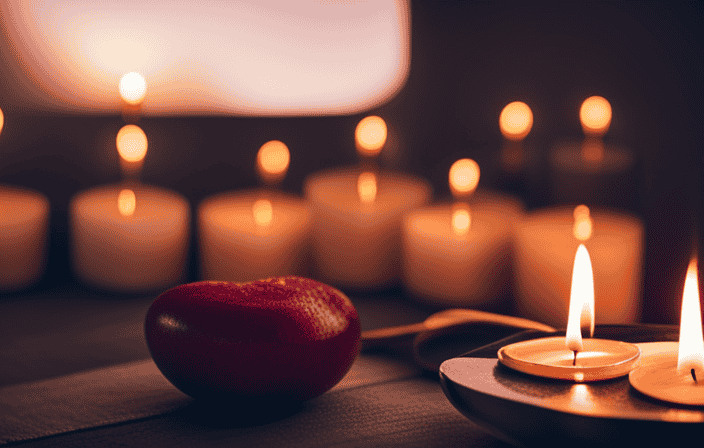Research shows that on average, people spend about one-third of their life sleeping. Getting enough sleep is crucial for maintaining overall health, and establishing good sleep habits is particularly important in your 30s.
One key factor in optimizing sleep is the quality of the mattress, as an old or damaged mattress can lead to discomfort and pain. Additionally, establishing a consistent sleep-wake cycle, managing light exposure, engaging in regular exercise, creating a relaxing sleep environment, managing stress, and avoiding electronic devices before bed are all healthy habits that can improve sleep quality.
In this article, we will explore these evidence-based strategies to help you optimize your sleep and enhance your overall health.
Key Takeaways
- Importance of a good mattress for restful sleep and avoiding backaches and joint pains
- Establishing a consistent sleep-wake cycle for better sleep quality and waking hours
- Managing light exposure to influence melatonin production and promote better sleep
- Engaging in regular exercise and maintaining a healthy diet for improved sleep quality
What is it?
The current subtopic focuses on understanding the concept of optimizing sleep with healthy habits. Sleeping routine benefits include improved sleep quality, increased energy levels, and better overall well-being.
Establishing a consistent sleep-wake schedule is crucial for optimizing sleep. This involves going to bed and waking up at the same time every day, even on weekends. Avoiding napping and sleeping in can help maintain a regular routine.
Engaging in slightly stimulating activities, such as light exercise or reading, before bedtime can also promote better sleep. Additionally, managing light exposure is essential. Exposing oneself to sunlight in the morning and ensuring a dark room for sleep can help regulate melatonin production and enhance sleep quality.
By following these tips, individuals can optimize their sleep with healthy habits and reap the benefits of a restful night’s sleep.
Importance of a Good Mattress
A good mattress acts as a supportive foundation for a restful slumber, cradling the body’s contours like a gentle embrace. Choosing the right mattress for your sleep needs is crucial for optimal sleep quality.
Here are the key reasons why a good mattress is important:
-
Proper support: A mattress that provides adequate support helps maintain proper spinal alignment, reducing the risk of backaches and joint pains.
-
Sleep comfort: A comfortable mattress promotes deep and uninterrupted sleep, allowing you to wake up refreshed and rejuvenated.
-
Body conformity: A mattress that conforms to the body’s contours helps distribute weight evenly, relieving pressure points and enhancing overall sleep quality.
-
Durability: An old or worn-out mattress can negatively impact sleep quality, leading to discomfort and disturbances during the night.
-
Overall sleep quality: Investing in a high-quality mattress that meets your specific sleep needs can significantly improve your sleep quality and overall well-being.
The impact of a poor mattress on sleep quality cannot be underestimated. It can lead to restless nights, discomfort, and even contribute to sleep disorders. Therefore, it is essential to carefully research and choose a mattress that provides optimal support and comfort for a restful slumber.
Establishing a Sleep-Wake Cycle
Establishing a regular sleep-wake schedule contributes to better rest and overall sleep quality. However, certain factors can disrupt this cycle, such as shift work and travel.
Shift work, characterized by irregular working hours, can significantly impact the body’s natural sleep-wake patterns. Constantly changing shifts can lead to difficulty falling asleep and staying asleep, resulting in reduced sleep quality.
Similarly, travel, especially across different time zones, can disrupt the sleep-wake cycle. Jet lag, caused by the misalignment of the body’s internal clock with the new time zone, can result in insomnia, fatigue, and decreased alertness.
To mitigate the impact of shift work and travel on sleep, it is recommended to maintain a consistent sleep schedule as much as possible, expose oneself to natural light during waking hours, and establish a relaxing bedtime routine.
Managing Light Exposure
Light exposure plays a significant role in regulating the body’s internal clock and can influence the quality of sleep obtained. Melatonin production, a hormone that helps regulate sleep-wake cycles, is influenced by exposure to light.
Incorporating natural light into the daily routine can help optimize sleep quality. Spending time outside during the day and exposing oneself to sunlight in the morning can help wake up the body and promote alertness.
It is also important to ensure a dark room for sleep by eliminating sources of light pollution and using sleep masks or effective curtains.
Additionally, it is essential to avoid bright screens before bedtime as they can disrupt the sleep pattern.
By managing light exposure effectively, individuals can improve their sleep quality and overall well-being.
Exercise for Better Sleep
Regular physical activity has been shown to enhance sleep quality and energy levels, making it beneficial for promoting better sleep. The impact of physical activity on sleep quality is well-documented, with studies consistently demonstrating that exercise can improve the duration and depth of sleep. Engaging in regular physical activity has been found to reduce the time it takes to fall asleep, decrease the number of awakenings during the night, and increase the overall time spent in deep, restorative sleep.
Additionally, exercise has been shown to have a positive effect on insomnia, a common sleep disorder characterized by difficulty falling asleep or staying asleep. Research suggests that incorporating even light movement, such as a 10-minute walk, can enhance sleep quality. It is important to note that consistency in exercise is key, as the sleep benefits are more pronounced with regular physical activity.
Therefore, individuals seeking to optimize their sleep should consider incorporating exercise into their daily routine.
Dietary Habits for Better Sleep
In a world where late-night snacking has become the norm, it is ironic that our dietary habits can significantly impact the quality of our sleep. However, the foods we consume and our hydration levels can play a crucial role in promoting better sleep. Here are three key factors to consider:
-
Incorporate sleep-promoting foods: Certain foods contain components that can aid in better sleep. For example, tryptophan-rich foods like turkey, nuts, and seeds can help increase the production of melatonin, a hormone that regulates sleep. Additionally, foods high in magnesium, such as leafy greens, avocados, and bananas, can promote muscle relaxation and better sleep quality.
-
Hydration and sleep quality: Dehydration can disrupt sleep patterns and lead to sleep disturbances. It is important to maintain proper hydration throughout the day, but avoid excessive fluid intake before bedtime to minimize nighttime bathroom trips. Opt for hydrating foods such as watermelon, cucumbers, and oranges to support healthy sleep.
-
Avoid stimulants and heavy meals: Consuming stimulants like caffeine in the evening can interfere with the sleep cycle. It is advisable to limit or avoid caffeine intake close to bedtime. Additionally, heavy meals within two hours of bedtime can cause discomfort and make it harder to fall asleep. Opt for lighter, easily digestible meals in the evening to promote better sleep.
By incorporating sleep-promoting foods, maintaining proper hydration, and avoiding stimulants and heavy meals, individuals can optimize their dietary habits to improve sleep quality.
Importance of a Dark Room
A dark room is essential for creating an environment conducive to quality sleep. Light exposure during sleep can disrupt the body’s natural sleep-wake cycle and negatively impact sleep quality. To ensure a dark room, the use of blackout curtains or blinds is recommended. These curtains effectively block external sources of light, such as streetlights or early morning sunlight, creating a more favorable sleep environment.
Additionally, sleep masks can be beneficial in blocking out any remaining light, especially for individuals who are more sensitive to light. By eliminating sources of light pollution in the bedroom, individuals can promote better sleep and improve their overall sleep quality.
Creating a dark room is an important step in optimizing sleep and should be prioritized along with other healthy sleep habits.
Creating a Relaxing Sleep Environment
Creating a relaxing sleep environment is crucial for optimizing sleep quality. After understanding the importance of a dark room, it is essential to consider other factors that contribute to a peaceful atmosphere.
One effective way to create a soothing environment is by using essential oils in the bedroom. Certain scents, such as lavender or chamomile, have been found to promote relaxation and improve sleep. By diffusing these oils or using them in a spray, the calming effects can be enhanced.
Additionally, it is important to maintain a cool sleep environment. Keeping the bedroom temperature between 60 to 67 degrees Fahrenheit (15 to 19 degrees Celsius) has been found to be optimal for sleep. This cool temperature helps lower the body’s core temperature, signaling the brain that it’s time to sleep.
To achieve a cool sleep environment, ensure proper ventilation and use breathable bedding materials, such as cotton sheets.
Managing Stress for Better Sleep
To improve sleep quality, managing stress levels is crucial. High levels of stress can significantly interfere with our ability to fall asleep and stay asleep throughout the night. Therefore, incorporating stress management techniques into our daily routine can help promote better sleep.
One effective technique is deep breathing, which can activate the body’s relaxation response and reduce stress levels. By taking slow, deep breaths and focusing on our breath, we can calm our mind and prepare it for sleep.
Additionally, keeping a worry journal can be helpful in releasing anxious thoughts before bed. By jotting down our worries and concerns, we can alleviate their hold on our minds and create a sense of closure, allowing for a more peaceful sleep.
Avoiding Electronic Devices Before Bed
Minimizing exposure to electronic devices before bedtime can enhance sleep quality and promote a more restful night. The blue light emitted by screens, such as those on smartphones, tablets, and laptops, can disrupt the production of melatonin, the hormone that regulates sleep-wake cycles.
To create a device-free zone in the bedroom, it is recommended to turn off electronic devices 1-2 hours before bedtime. Additionally, using blue light filters or activating night mode on devices in the evening can help reduce the impact of blue light on sleep.
By avoiding electronic devices before bed, individuals can create a calming environment that supports relaxation and optimal sleep.
Seeking Medical Advice
Consulting a healthcare professional is essential if sleep problems persist, as medical issues and sleep disorders can significantly contribute to difficulties in achieving restful sleep. Seeking medical advice is crucial to address any underlying health conditions or sleep disorders that may be affecting sleep quality.
Telemedicine offers convenient access to healthcare professionals, allowing individuals to discuss their sleep concerns remotely. This method provides benefits such as reduced waiting times, convenience, and the ability to receive expert guidance from the comfort of one’s own home.
However, it is important to know when to seek a sleep specialist. If sleep problems persist despite implementing healthy sleep habits and seeking initial medical advice, a sleep specialist can provide a more in-depth evaluation and recommend specialized treatments to improve sleep quality.
Frequently Asked Questions
What are some tips for falling asleep faster?
To fall asleep faster, create a sleep-friendly environment by keeping the bedroom dark and cool, establishing a calming bedtime routine, and using soothing scents. Avoid electronic devices before bed as they can disrupt sleep quality.
How does caffeine affect sleep quality?
Caffeine, the sleep thief, disrupts sleep quality by blocking adenosine receptors in the brain. To minimize its effects, limit caffeine intake in the evening, opt for decaffeinated beverages, and allow sufficient time for its effects to wear off before bedtime.
What are some natural remedies for insomnia?
Some natural remedies for insomnia include alternative therapies such as cognitive-behavioral therapy for insomnia (CBT-I), relaxation techniques like meditation and yoga, herbal supplements like valerian root and chamomile, and aromatherapy with lavender essential oil.
Can certain foods or drinks help promote better sleep?
Certain foods that can promote better sleep include cherries, kiwis, bananas, almonds, walnuts, and warm milk. Herbal teas like chamomile, valerian root, and lavender can also aid sleep. Avoiding caffeine and heavy meals close to bedtime is advised.
What are some common sleep disorders and their symptoms?
Common sleep disorders include insomnia (difficulty falling or staying asleep), sleep apnea (breathing interruptions during sleep), and narcolepsy (excessive daytime sleepiness). These disorders can negatively impact overall health, but effective strategies such as cognitive behavioral therapy and medication can improve sleep quality.










